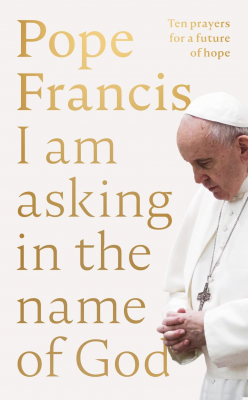Pope Francis - I am asking in the Name of God: Ten prayers for a future of hope

Pope Francis - Am Asking in the Name of God: Ten Prayers for a Future of Hope - Publisher: SPCK, 2023. 137 pp. £16.99
This is a puzzling book. It does not fit easily into any category. Although it is cast in the format of prayer it is more like an agenda for the world, written in the language of urgency, shot through with concern for the wellbeing of all people, and indeed of the planet itself. Pope Francis directs his words not only to believers but to all men and women of goodwill.
There is a bracing honesty here. The very first theme is the desire that the culture of abuse be eradicated from the Church. The importance of listening to victims is emphasised. The other themes are:
protection of our common home;
resistance to fake news and hate speech;
a politics orientated towards the common good;
an end to the madness of war;
a welcome for immigrants and refugees;
greater participation in society by women;
economic growth for poor countries;
universal access to health care;
and not using the name of God to incite wars.
Pope Francis points out that it is often the poorest who are most vulnerable to climate change. Technology should not only seek a cleaner planet and clean sources of energy, but the technology that makes such things possible should be generously transferred to poorer countries. He would like to see the Catechism of the Catholic Church recognise and condemn ecological sins.
Like many of us, he is worried about how the power and immediacy of mass media enables 'the growth of hate speech, indoctrination, and political manipulation, which many times take advantage of the fragility and vulnerability of people's social situations.'
However, reading this book I was left wondering about its tone. Even although it is addressed to all people of goodwill, sometimes it uses language that would leave the average reader struggling. For example: 'Current events ask us to always be seen, analyzed and judged with the hermeneutic of the day and not with bygone metrics.' Part of the difficulty may be its collaborative origin with an Argentinian journalist Hernán Reyes Alcaide who is listed as editor, but from Reyes Alcaide's postscript it seems he played a key role shaping the book in dialogue with the Pope. The move from dialogue to unified text may not have been easy.
Pope Francis writes beautifully and challengingly on the migrant crisis. He wants them to be welcomed, protected, helped and integrated, and he is concerned about what he calls 'a globalization of indifference' towards refugees. Part of the problem is modern society's tendency towards individualism and disposability. As ever, he is thought-provoking, and reading this I remember our own Home Secretary's recent reference to an 'invasion'.
Here, as in several places we may wonder about the book's lack of shading. For example he refers to his visit to Lampedusa in 2013. But recently that in one week a record 11,000 migrants arrived on that tiny island (which has a population of only 6,000) . Nations like Italy are struggling to help, and even in Britain we are concerned about the growing cost of looking after those who come over in small boats. The book would have been stronger if Pope Francis acknowledged the difficulties of finding the solutions he recommends. And I mourned the lack of actual prayer. Each chapter cried out for a specially composed prayer at the end. An opportunity missed.


















